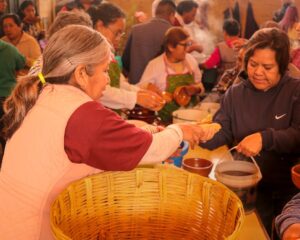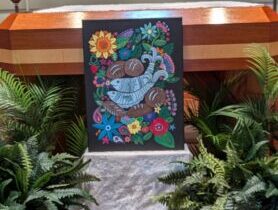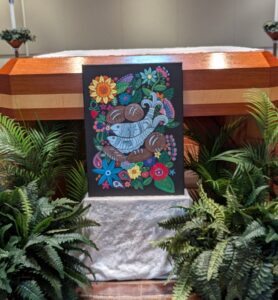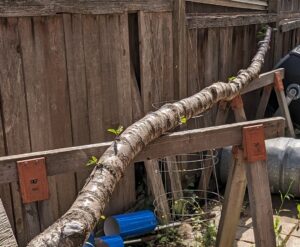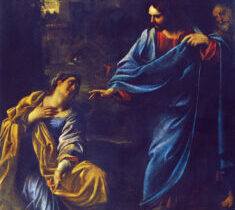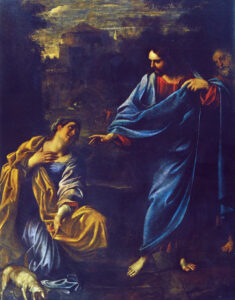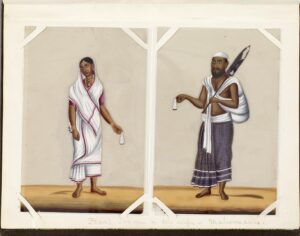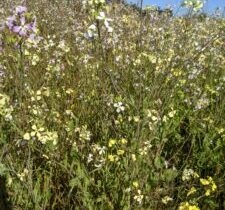Love – Worth More than Burnt Offerings
 She was a large woman, tall and heavy-set, with dark skin and a unique way of dressing. I most frequently saw her with a portable grocery cart full of her possessions alongside a road in town. There was a creek running in a channel down the middle of the road, with trees and brush in which one could spend a night or rest during the day undisturbed by passersby and she often went there. She seemed to have health problems and getting around was clearly not always easy for her.
She was a large woman, tall and heavy-set, with dark skin and a unique way of dressing. I most frequently saw her with a portable grocery cart full of her possessions alongside a road in town. There was a creek running in a channel down the middle of the road, with trees and brush in which one could spend a night or rest during the day undisturbed by passersby and she often went there. She seemed to have health problems and getting around was clearly not always easy for her.
She dressed in clothing that looked like she might be from the Middle East, with her head and most of her face covered in scarves and robes that reached down over her legs. I suspected she might be Muslim, but I only saw her along that busy road ordinarily, so there was no opportunity to find out more about her.
Then one day, she came to mid-day Mass at a local chapel. Over a period of several weeks, I often saw her there. We always smiled at each other, but we didn’t typically talk much. She sat off to the side, behind a short partition that separated out a side altar and entrance from the rest of the body of the chapel. There was room for her and her cart in that section.
After Communion one day, she had her rosary in her hand and dropped it over the side of the partition. A woman picked it up and handed it back to her. She accepted it with a smile and a comment, “You are close to the Kingdom of God. Thank you.”
I later learned as we walked together after Mass on our way home that she tested people that way. She would drop something and see if they would pick it up for her. If they did, she knew it would be safe to trust and befriend them.
Time went on and my family situation changed. I was no longer able to attend daily Mass. I kept an eye out for her around town, but it’s been over 15 years since I last saw her. I think of her often. She wore the coverings for her head, face, and body in solidarity with her “sisters around the world” who have no choice but to wear them, regardless of how warm or hot the weather is. She was a prophet in our midst, saying little with words, but much with her way of dress and behavior – finding those close to the Kingdom.
Close to the Kingdom
A scribe, an educated man, approached Jesus one day and asked him what the first, most important of all the many commandments was. (There are 613 commandments in the Torah, the first five books of the Bible, not just the ten that we usually think of as The Commandments.)
Jesus responded without hesitation, reciting the Shema, the fundamental statement of Jewish tradition and worship. “Hear, O Israel! The Lord is our God, the Lord alone! Therefore, you shall love the Lord, your God, with all your heart, and with all your soul, and with all your strength.” This statement is called the Shema because it begins with the Hebrew word shema which means “hear.” Jesus continued beyond the traditional Shema, giving a second command, as important as the first. “You shall love your neighbor as yourself.”
The scribe was pleased with Jesus’ response. He summed it all up by noting that to love the Lord with one’s whole heart, understanding, and strength and to love a neighbor as yourself “is worth more than all burnt offerings and sacrifices.”
Jesus praised the scribe for his understanding, “You are not far from the kingdom of God.”
No one asked any more questions. It had all been said. This is what it was all about. Love of God and of neighbor. (Mk 12:28b-34)
The focus on love as a response to God is fundamental in the Jewish and Christian traditions. It is found right after the statement of the basic ten commandments in the book of Deuteronomy. Moses presented the requirement to the people that they love the Lord and follow his commandments, so they could be blessed with a long, prosperous life in a land of abundance which the Lord would provide. The Shema summarized the Lord’s command to love and be loyal to him. (Dt 6:2-6)
Love is a word that we often equate to romantic love. But in this context, it has a different meaning. Love here means to be loyal to someone or something. It requires a commitment to stick together through thick and thin and a promise that the Lord has something good that will come to those who are loyal to him even in hard times.
Jesus showed us how to be loyal to the Father through hard times when he accepted death rather than deny the kingdom he had come to proclaim. The author of the Letter to the Hebrews notes that as our high priest, he was “holy, innocent, undefiled, separated from sinners, higher than the heavens.” The one who is perfect in love is the one who always speaks on our behalf to the Father. (Heb 7:23-28)
So how does this all relate to my friend and her little test?
As citizens of the Kingdom, we are called to Love the Lord, as the Shema declares, with all our heart, all our soul, and all our strength. We are also to love our neighbors, with the same strength and commitment we have given to the Lord. We are to love them as ourselves, looking out for their interests as we would our own.
We can preach all we want to about Jesus, about the Law, about the Commandments, about purity in our thoughts and behaviors, about how we worship. But if we don’t really love and respect each other, if we don’t help each other willingly and without expecting anything in return, if we only speak to those with whom we agree or who look like us or who live respectably like we do, then we are missing the point of the Kingdom! Do we stoop to the ground to pick up something a person we don’t know has dropped? Do we take time to smile and chat with a child or a baby as we wait in a line? Do we wait our turn patiently to get through a traffic light or move ahead on the freeway? Are we kind to those who don’t meet our society’s standards of beauty? Do we trust that others may have valid reasons for doing things differently than we ourselves might do?
If we insist on forcing our opinions or our ways of doing things on others, are we really living what Jesus taught? Are we really loving God and neighbor? Are we loyal to the God who made us as free persons and therefore choose to support others in their free response to God’s love?
This week, many decisions will be made that affect what life will be like in the years to come. Some of them will be politically based. Some will determine the direction of countries in the months and years to come. Some will simply be the ones that affect ordinary folks in living out life as family.
Let us pray for the wisdom to choose wisely, to love each other and support each other’s freedom to choose how each moves forward in life. Let us resolve to lend a hand in support of those we meet along the way. Sometimes an action as simple as bending over to pick up a rosary for someone else is a sign of closeness to the Kingdom of God.
This love in action, offered without recrimination or condemnation, is “worth more than all burnt offerings and sacrifices.” It is what brings us into the kingdom of God,” right here and right now.
Readings for the Thirty-first Sunday in Ordinary Time – Cycle B
Read More







